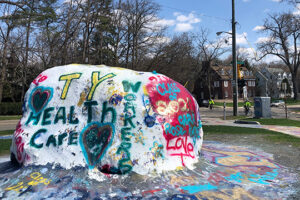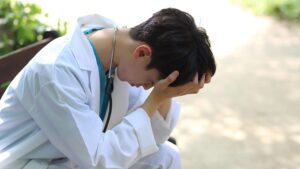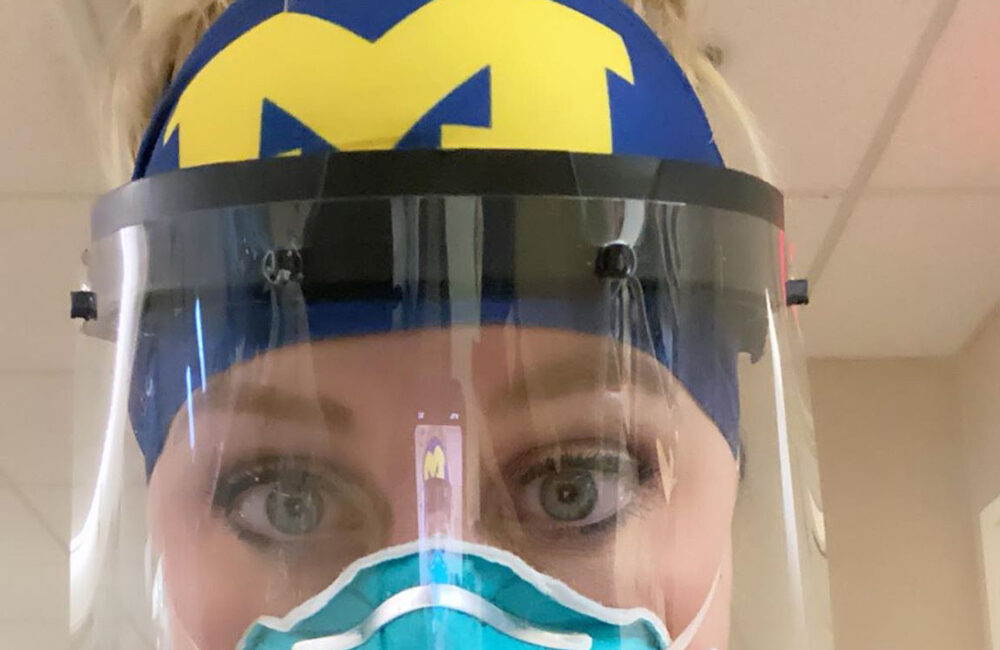Heroes work here
A few months ago, the country clapped for them.
Posted signs in yards and tied ribbons on trees saluting them.
Wrote songs and donated food for them.
An outpouring of public support may have helped buoy the spirits and well-being of health care workers as they faced the early months of the coronavirus pandemic.
But as the salutes fade into memory, and COVID-19 cases and hospitalizations rise across the United States, mental health experts are worried about the health care workers-turned-heroes who were so much in the spotlight a few months ago.
Extra emotional stress
The toll of caring for patients with a deadly new virus has left tens of thousands of doctors, nurses, therapists, and others with a real risk of ongoing depression and even post-traumatic stress disorder.
At highest risk are workers in the areas that were hit hardest in the early part of the pandemic, when some hospitals and nursing homes were overwhelmed with COVID patients, and when both protective gear and solid information about the virus were scarce.
The personal risk they faced, along with the lack of an effective treatment and a high death toll, made already demanding jobs even harder, says Srijan Sen, MD/PhD, a U-M psychiatrist who studies the mental health of physicians.But now, the mental strain on frontline heroes is likely to rise in the cities whose hospitalized cases and deaths have just started to surge.
Health care workers in those areas may be prone to extra emotional stress, Sen says, because many of the cases they’re treating could have been prevented if more governments and individuals implanted and followed science-based public health guidelines more swiftly and effectively.

Seeing fellow Americans defy public-health recommendations may be demoralizing to frontline workers, researchers say. (Credit: Stock photo.)
“When front line workers feel their efforts aren’t being supported by the public, for example, by following social distancing, this can be very demoralizing,” he says.
Sen’s team is currently studying the data collected daily over the past year from thousands of first-year medical residents across America enrolled in the Intern Health Study.
The team’s past work has shown how the intense stress of medical training in non-pandemic times leads to symptoms of depression in one-quarter of new doctors, and accelerates changes in DNA.
They recently published data from their work in China, showing a rise in depression and anxiety among young doctors far from the cities with the most COVID-19 cases. Soon, they hope to publish data on how COVID-19 affected the group of American doctors who just finished their intern year.
Worries about those not on the front line

Some grateful painter shared their feelings on the Rock: ‘TY Health Care Workers.’ (Image: D. Holdship.)
Even among health professionals whose work doesn’t involve patients with serious cases of COVID, the added stress of providing care in these times could add to their already-high risk of burnout, depression, and suicide, says Katherine Gold, MD/MSW/MS, a U-M family medicine physician who has studied physician suicide.
Those who aren’t on the COVID ‘front lines’ also may feel guilty about not being able to help their colleagues who are caring for COVID patients, while still receiving the praise and shows of thanks from the public.
The protests against public health restrictions, as well as rapid re-openings and failure to follow guidelines for masking and distancing, may wear on all healthcare workers, Gold notes. So might any refusals to get vaccinated once a vaccine is developed.
“Already, I’m hearing a lot of general frustration among colleagues over the public’s anti-science perspective, and people putting others at risk,” she says. “I’m seeing conversations in private Facebook groups for health workers about the disrespect they’re getting from patients who refuse to wear masks, or deliberately cough on them. It can lead to a very real sense of ‘why am I putting my life on the line if it doesn’t matter,’ and a real sense of lack of control.”
That could be compounded by financial pressures, as health systems ramp back up for in-person care, and try to make up for the revenue lost this spring through added clinical care duties or layoffs.
Taking care of their own
Many hospitals that have cared for COVID patients have launched special mental health support programs for their staff. That includes new options for Michigan Medicine, U-M’s academic medical center. They’re highlighted on the website of its Wellness Office, led by psychiatrist Kirk Brower, MD.
Brower notes that in recent years, research has yielded ways to help health care workers recover mentally from disasters, including recognition of the typical phases of a person’s response.
“This model of psychological response to disaster can be helpful in understanding what all of us, and especially front line staff, are experiencing,” he says. “The main difference is that the coronavirus pandemic is not a single disaster event, but a prolonged period of stress and uncertainty.”
Brower and his colleagues, working together with the Office of Counseling and Workplace Resilience, have launched text-based, phone-based, and video-based mental, emotional, and spiritual health support services for Michigan Medicine’s 28,000 team members, in addition to in-person services for hospital care teams.
Those services, and services like them at hospitals nationwide, need to continue to be visible and available for the long term, says Brower.
Even as the peak of the pandemic eases in the state of Michigan — thanks to a wide range of efforts at the state and local level — he and his colleagues anticipate continued use of these options.
“We need time to work through our grief over the losses of patients and family members who may have died as well as the loss of social contact and our usual routines,” he explains. “Fear about losing a job after all the sacrifices made are now added to fears of infection with the coronavirus. Working in health care during COVID-19 means we are all forever changed, whatever happens.”
Eroding the stigma of seeking help

Physicians have great access to health care, and understand the benefit of it, but there’s still a tremendous stigma to seeking mental health care among physicians. (Image: iStock.)
Just the act of seeking help for depression and suicidal thoughts is one that Gold has seen change over time among once-reticent medical professionals.
In her most recent study of death records from physicians who had died by suicide, in the pre-COVID era, she saw signs that more had sought mental health care and received a formal diagnosis of depression than when she last studied the issue nearly a decade ago.
“As physicians, we have great access to health care and understand the benefit of it, but there’s still a tremendous stigma to seeking mental health care among physicians,” she says. She’s especially troubled by the finding that female physicians who died by suicide were less likely than male physicians to have sought help before their deaths. This echoes findings from her past work surveying female physicians about their mental health.
As more health care workers cope with the long term strain of having cared for COVID patients, it will be important to keep reaching out to them to encourage them to seek help, she says.
“We need to think about why female physicians, especially, are not reporting mental health issues and accessing mental health care, especially in the era of COVID,” Gold advises.
Removing questions about past mental health care from medical licensing disclosures, and replacing them with specific questions about whether a physician has problems that could impair their ability to function now, could help.Making mental health services convenient to busy health care workers, and giving them time to process what they’ve experienced and connect with others who have been through the same, also will be important.
Post-COVID availability of telemedicine options for visits with mental health providers, which don’t require as much time away from the workplace as in-person visits, could also help.
Brower speaks from experience about the importance of seeking professional counseling during times of distress. When his daughter faced a serious health crisis, he turned to a mental health professional for help in processing and coping with his feelings and worries.
“It’s not crazy to do so, and you don’t need to be crazy to do so,” he says. “But it’s crazy not to if you need to.”
Paying attention to life outside of work
When heroes go home, the actions they take can help them process what they’ve experienced at work – or worsen them.
“Isolation is a big risk factor in depression, so health providers need to protect themselves by replacing their regular in-person social supports with virtual ones, especially when they’re working long hours,” Gold says.
Getting enough sleep and exercise, and being encouraged by leaders to take time for these healthy habits and for self-care, can also help protect against depression and burnout.
“Before in medicine, the culture if you were sick physically or emotionally was to power through it and not discuss it with colleagues or take the day off,” says Sen. “It’s clear now that if you come in as a health care worker with a cold or cough, it’s letting the team down. If we can extend that to mental health, that will be healthier for everyone.”
For physicians and other health professionals who also have a working spouse, and preschool or school-age children, the demands of home life may add to work-related stress – especially for women. Research has shown that male physicians are more likely to have a partner who works part time or doesn’t work outside the home, while among married female physicians, 95 percent have a partner who works full time.
Sen and his colleagues found that work-family conflict played a significant role in the difference in depression risk among first-year medical residents. His colleague Elena Frank, PhD, also led a study that found 30 percent of early-career female physicians with children were working part time compared with 5 percent of men.
“I worry that this will be exacerbated as the pandemic continues, and the burden will fall disproportionately on women physicians,” says Sen. “The consequences would be long-term if we lose even more of these highly trained and talented people from the physician workforce, which would exacerbate the existing shortage of doctors.”
In the end, the public’s support for health care “heroes” still matters, even if it’s not at the level it was in March and April. So does sustained support from health care institutions for their workers’ mental health, to make sure they know they have resources and are encouraged to use them.
“Some things have changed, maybe for the better,” says Sen. “We need to hold on to the positive change.”
This story is republished courtesy of Michigan Medicine’s Health Lab Blog. The lead image is courtesy of Ashley McClellan, a registered nurse at Michigan Medicine.




Cynthia Farina - 1983, 2016
Thank you for printing this article and for recognizing the psychological impact of the COVID pandemic on health care workers. During my 37 year career as a nurse, I never imagined that I would be dealing with a situation like this one. While I could write a book about what has transpired over the last 4 months (seems like 4 years), I would like to share some of my perceptions of this situation that I suspect may be shared by many others. Prior to this pandemic health care professionals were facing an alarming prevalence of burnout that was acknowledged by the National Academy of Medicine. The COVID 19 pandemic brought job distress to a new level. There were pre-existing strained relationships between health care workers and health care systems leaders. To me, it was infuriating to suddenly be called a hero when it was time to walk into the line of fire while so many others went into hiding in their home offices. We have been heroes all along. Why didn’t everyone say so before with the same vim and vigor as now? I barely hear any acknowledgement of the world class school of nursing that sits on our Ann Arbor campus. But we all hear a whole lot about the football team and Ross school of business. Where are they now? Second, one of the worst things about dealing with COVID in the hospital setting were the unknowns and “shrugs” about how to keep ourselves safe. Now that the peak has passed, we often don’t know if our patients are infected with COVID, because we aren’t testing them before they come in for procedures. This is not only a danger to us, but to other patients as well. We could take a lesson from history, but we refuse to learn from it. In the past, infectious disease hospitals were created to keep patients with contagious diseases separate from the rest. Why not do this again? Yes, it would be a massive undertaking, but should be a contingency plan for situations like this one. Also, staff the hospital with those who volunteer and give them premium pay instead of putting a figurative gun to the heads of staff who don’t want to be in such a situation. This would also reduce exposure to other patients and help hospitals maintain normal operations and continue to provide the services to the patients who need them. Third, it is indeed infuriating to watch the general public and our nation’s leaders ignore the dangers of COVID 19 by refusing to take appropriate actions to control its spread. We have heard about people refusing to wear masks for any number of ridiculous reasons. Their recklessness, stubbornness, and stupidity puts the safety of health care workers on the line and will desecrate our health care institutions. Next, hospital propaganda perpetuates a myth that staff just love to care for COVID patients. Ask the employees, and they will tell you that the thank you signs and video displays of smiling staff members posing in PPE is a bunch of nonsense and insults us all. What you will hear the staff say is, “I don’t want to be here for the next wave,” and those who don’t want to wear masks nor social distance “can sit in their car and die.” I just shake my head at the rising numbers of COVID cases today. The first wave that hit Michigan and other states caught us off guard. The next waves are under our control and otherwise our fault. Is it surprising that health care workers are being pushed over the edge? Next, anything I read about managing burnout and employee distress focuses on trying to fix the individual and not the environment. Burnout experts, such as Dr. Christine Maslach, and those at the National Academy of Medicine will tell you that burnout is a sign of workplace dysfunction not individual failure. So addressing burnout and psychological distress with conventional interventions aimed at individuals is a step in the right direction, but not a solution to problems that affect the well-being of health care professionals.
There have been studies done in the last few years that assess health care provider willingness to serve in disasters, including pandemics. An overwhelming majority are willing to do so. However, that number drops to about 50% when an infectious disease is the cause and adequate PPE is not available. As we have doubted the adequacy of PPE and infectious disease practices in our institutions, you can imagine the stress experienced by health care providers during this current pandemic. We are all human first with an instinct for survival that clashes with professional duties and ethics. If one reads about professional ethics as stated by the American Nurses Association, there is a section that describes a nurse’s prerogative to decide whether or not to face personal danger in caring for patients. That’s a terrible choice to make. It is also interesting to consider Basic Life Support training. What is the first step a rescuer should take if they find someone “down?” It’s not to assess patient responsiveness, open the airway, or take a pulse. The first step is to assess the situation and see if it is safe for the rescuer before lending assistance to the victim.
While I cannot speak for the medical profession, I have plenty of experience as a nurse. Our profession has been plagued by staffing shortages, work overload, patient safety issues, lack of respect, and low pay for as long as I have held a license. Nonetheless, we have found our careers immensely rewarding. However, we are dealing with an unimaginable stressor that we hope goes away soon and is not seen again. I hope we all learn from this awful experience with respect to disaster preparedness and enhancing the well being of healthcare providers in genuine, meaningful ways. And don’t forget, election day is November 3.
Reply